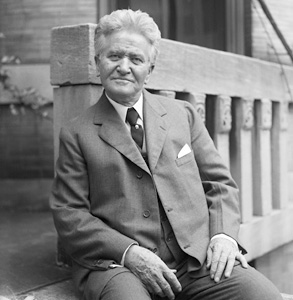La Follette, << luh FOL iht, >> is the name of an American family that was prominent in politics and social reform.
Robert Marion La Follette, Sr.
(1855-1925), sometimes called “Battling Bob,” was an American political leader and reformer. For 25 years, he was the most important figure in Wisconsin politics.

La Follette became a lawyer in 1880 and a United States congressman in 1885. Following his defeat in the election of 1890, he practiced law in Madison, Wisconsin. He became the leader of a group within the Republican Party that opposed the conservative state leadership. Elected governor in 1900, he made Wisconsin progressive. At his urging, the legislature provided for direct primary elections, equalization of taxation, conservation of forests, and control of railroad rates.
From 1906 to 1925, La Follette was a United States senator. He advocated strict railroad regulation, lower tariffs, conservation, and better conditions for American sailors. He opposed U.S. entry into World War I and U.S. membership in the League of Nations.
La Follette broke with the Republicans in 1924 when Calvin Coolidge was nominated for president. La Follette accepted the presidential nomination of a new Progressive Party, backed by independents and many labor groups. He received almost 5 million votes, but he carried only Wisconsin. La Follette was born on June 14, 1855, in Primrose, Wisconsin, near Mount Vernon. He died in Washington, D.C., on June 18, 1925. He represents Wisconsin in Statuary Hall in the United States Capitol. See Progressive Party.
Belle Case La Follette
(1859-1931), the wife of Robert M. La Follette, Sr., was a noted journalist, speaker, and social reformer. She promoted many progressive causes and strongly supported women’s rights.
In 1885, Belle La Follette became the first woman to graduate from the University of Wisconsin Law School. She did not practice law but used her legal training extensively in assisting her husband throughout his political career. In 1909, she and her husband established La Follette’s Magazine. She edited its “Home and Education” department. Belle La Follette strongly opposed war, and she worked with the Woman’s Peace Party during World War I. After the war, she helped found the Women’s Committee for World Disarmament.
Many Wisconsin leaders urged Belle La Follette to run for her husband’s seat in the U.S. Senate after he died in 1925. She refused to do so but helped her son Robert win election to the office. She was born on April 21, 1859, in Summit, Wisconsin, near Mauston. She died on Aug. 18, 1931.
Robert Marion La Follette, Jr.
(1895-1953), was elected United States senator from Wisconsin after his father’s death. He supported the rights of organized labor and led a movement to increase the efficiency of Congress. The Wisconsin Progressives, under La Follette’s leadership, continued as an independent party until 1946, when they rejoined the Republicans. La Follette lost in a try for renomination to the Senate in the 1946 Republican primary. He was born in Madison, Wisconsin, on Feb. 6, 1895, and died in Washington, D.C., on Feb. 24, 1953.
Philip Fox La Follette
(1897-1965), the second son of Robert La Follette, Sr., and Belle La Follette, served as governor of Wisconsin from 1931 to 1933, and again from 1935 to 1939. During his terms, legislation was passed to aid labor, farmers, and homeowners. La Follette was born in Madison on May 8, 1897, and died on Aug. 18, 1965.
